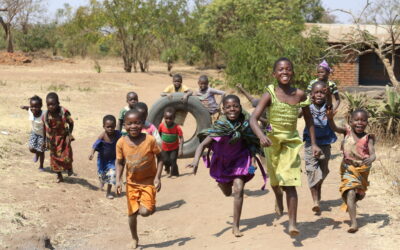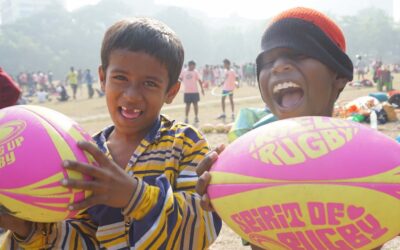Here at The Atlas Foundation, our goals, mission, and objectives are very clear: we support children around the world to improve their aspirations, opportunities, life chances, and happiness and work to address negative outcomes linked with hardship, poverty, inequality, and disadvantage.
Alongside clarity about what we seek to achieve and why, we also focus on sharp, strategic goal setting, ensuring our work across our extensive partnerships is cohesive, traceable, sustainable and practical—making a difference now that will resonate through the years and continue helping children for the entirety of their lives.
Our supporters may have noticed our grid of Sustainable Development Goals, which we use to define and drill down into the most profound challenges and hardships children face and to develop plans, projects, and schemes that will make the biggest impact in the areas where it is needed most.
Here, we’ll explain the origin of those goals, why they are so vital, and why each goal isn’t numbered sequentially.
Understanding the United Nation’s Sustainable Development Goals
While we’ve selected specific goals that we can contribute to solving, the wider framework of Sustainable Development Goals (SDGs) refers to 17 global targets, adopted by all United Nations members in 2015 as a collective agreement to strive towards better peace and prosperity for all people.
They are designed as a blueprint of actionable, real-world targets that UN countries have committed to delivering by 2030, from making human rights a standard for all residents to eradicating poverty and ending world hunger.
Aside from the schemes and projects at the governmental and UN levels, the goals are also seen as a call to action for every country in the partnership and for charities and non-profit community organisations.
The hope is that they will recognise the stark need for critically urgent support systems and move forward in a way that highlights pockets of deprivation and inequality that can sometimes be overlooked.
For example, the SDGs define the need to end poverty and improve education while also considering economic growth and climate change as equally important targets to ensure the future is brighter, fairer, and happier.
The Atlas Foundation and Our Adopted Sustainable Development Goals
The Atlas Foundation’s contributions apply to a remarkable 11 of the 17 goals, and as an international children’s charity, we don’t think this is as surprising as it may sound.
That is because basics like food underpin everything. Education standards, equality, and health cannot improve if large proportions of children simply don’t have enough food to eat. Likewise, if communities are experiencing profound poverty, there is little likelihood they will be able to achieve more sustainable resource consumption or have the capacity to focus on innovation.
To answer a common question, this selection of goals is why our grid of targets isn’t sequential. We have maintained the same references assigned by the UN because this helps all partners, charitable organisations, and governmental initiatives recognise where their priorities and focuses align.
Goal 1: No Poverty
SDG1 aims to end poverty in every form and place. This may not require much explanation because we all know that poverty is intrinsically linked with disadvantage and deprivation, and for some of the world’s most vulnerable children, a cycle of poverty has existed for generations.
Goal 2: Zero Hunger
SDG2 is all about achieving real food security, ending hunger, and promoting sustainable agriculture with improved nutrition for all. Alongside tackling hunger and avoidable health outcomes linked with poor nutrition, this initiative aims to combat high food prices, recognising that lack of nutrition impacts the development and well-being of 148 million children worldwide.
Goal 3: Good Health and Well-being
Our next target is to promote well-being in all its forms and ensure people can enjoy healthy, active lives. Examples of poor health in action include the 25 million children who were unable to receive important routine immunisations in 2021 and the surge in malaria cases—reaching 247 million in the same year.
Goal 4: Quality Education
Education, self-advocacy, and lifelong learning are foundational to most of our lives, yet equitable education and inclusive schools remain nonexistent or hard to come by in many locations—including for families here in the UK.
Although the number of children completing basic schooling is increasing, 84 million children are anticipated to be disconnected from any form of tuition by 2030. The Atlas Foundation strives to make education accessible to excluded demographics, supporting the education of young people and communities.
Goal 5: Gender Equality
SDG5 sets out to achieve gender equality and empower women and girls. Despite current worldwide efforts, the United Nations is falling behind on its expected deliverance of its 2030 targets.
At this pace, it would take 300 years to end child marriage, with one in five girls internationally married before they reach age 18. That’s why The Atlas Foundation recognises the importance of gender equality advocacy and supports initiatives that promote and catalyse gender inclusion.
Goal 6: Clean Water and Sanitation
Goal six is to deliver sustainable sanitation and water management and ensure that clean water is available to all. Although we rely on clean water through our taps every day, this is out of reach for so many, with 2.2 billion people lacking the most basic handwashing facilities and safe drinking water.
Goal 8: Decent Work and Economic Growth
This broad-scope goal is designed to promote sustainable economic growth by providing productive, full employment opportunities for all people in an inclusive and fair way. Currently, one in four children or young people receive no education, training, or employment, and girls remain twice as likely to face inequality or exclusion from opportunities to study or join the workforce.
Goal 10: Reduced Inequality
SDG10 creates a target to reduce inequality, not only within communities and countries but also between them. A staggering 34.6 million global refugees were recorded in 2022, of whom 41% were children. This goal also focuses on income differences, discrimination based on gender, and the loss of life due to a lack of safe migration routes.
Goal 11: Sustainable Cities and Communities
The 11th goal is to make cities and other settlements resilient, sustainable, safe, and inclusive. Currently, 1.1 billion people live in slums, which are anticipated to increase by a further 2 billion in the next 30 years, and half of urban residents have no access to public transport.
Goal 16: Peace, Justice and Strong Institutions
Our 16th goal is to deliver inclusive and peaceful societies built on effective, accountable justice and where institutions act with parity in the interests of the communities, residents, and members they serve. This target focuses on forcible displacement, trafficking, and intentional homicide—where almost half a million lives were lost to violent, deliberate crime in 2021.
Goal 17: Partnerships to Achieve the Goal
Finally, SDG17 aims to implement and revitalise the partnerships behind the targets and strengthen the ways in which those goals are delivered.
We believe that this is a fundamental necessity for any of the work across any of these initiatives to be successful, noting that all the efforts and impacts The Atlas Foundation has made over the last 10 years have been achieved through collaboration, teamwork and partnership.
We hope this brief guide illustrates why each of the goals we work towards matters, how they factor into our work, and the reasons behind the frameworks we use as a global children’s charity.



